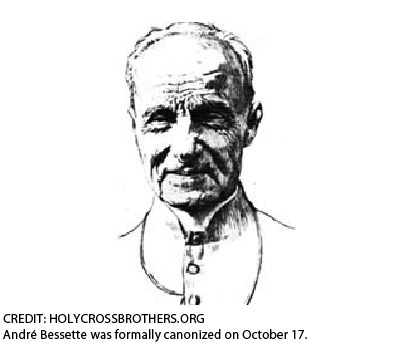Life Meets Faith: Do miracles happen?

If you are Catholic, you are probably familiar with the name Brother André. Even if you are not, during the past few weeks you likely heard his name on the news or saw some video about him. His full name is André Bessette and he died in 1937. He spent his life in Montreal. Many people believed that he performed miracles, healing people by asking God to cure them.
But do miracles happen? And what is a miracle?
Philosophers often define a miracle as God suspending the laws of nature to do something unusual. Grumpy British thinkers, starting especially with David Hume, have been skeptical of all reports of miracles. They say that reports of them can never be trusted because it is always easier to believe they are mistaken than that the laws of nature have been suspended.
One has to wonder what such a person would do if he showed up in Chile at the celebrations, prayers and Catholic mass following the rescue of the 33 miners. Many believe that God helped make the rescue a success. Shake their heads in pity at the poor deluded souls, I guess.
And what would they say about the canonization of Brother André? According to Toronto Star columnist Rosie DiManno, the Catholic church is declaring him a saint not only because of his humble life and his outstanding service to others. Many remember him healing people who could not walk as well as terminally ill people.
In particular there is the testimony of the healing in 1999 of a nine-year-old boy. Because of a car crash he was in irreversible coma. His family prayed directly to André to save the child and he lived.
This might seem easy for some to dismiss; however, consider that the Catholic church has miracle detectives as well as people whose role it is to criticize the claims of the detectives.
DiManno reported that the case to have Brother André declared a saint was led by Dr. Mario Lachapelle. He is a scientist with a PhD in medical and biological research, a person not only committed to examining evidence but someone who understands the human body. In the formal role called the "vice-postulator" for Brother André, he argued for canonizing him.
Before a (Roman Catholic) Curia tribunal, the vice-postulator must defend the claims about an alleged saint while another person called the "devil's advocate" attempts to expose the claims as false. (For a claim to sainthood to get this far means that many other formal hurdles have been passed. You can read about this in the book, The Miracle Detective, by Rolling Stone editor Randall Sullivan.)
A saint-making miracle has to meet four criteria. First, the miracle has to be lasting. For example, a "cured" cancer can't reappear a month later.
Second, the miracle has to be "quasiinstantaneous." It has to have happened right away, or almost right away after someone prayed for it to happen. Third, the miracle has to be linked to one particular saint, in this case, Brother André. In other words, if you pray to a number of saints, you can't argue that any one of them specifically provided the miracle.
And fourth, the "acid test." The healing has to be "scientifically unexplainable given existing medical knowledge, which means (having) depositions from attending physicians and experts in the field completely uninvolved with the case (for sainthood)."
It's a long road to Catholic sainthood. I myself am not Catholic though I am a Christian. But whether one is or not, one has to know that claims of the miraculous in the Catholic community are not taken lightly, and that if it is determined that one has occurred, as much evidence as possible has been taken into account.
Michael Veenema was a chaplain at Fanshawe until 2004. He continues to write from his home in Nova Scotia.
Editorial opinions or comments expressed in this online edition of Interrobang newspaper reflect the views of the writer and are not those of the Interrobang or the Fanshawe Student Union. The Interrobang is published weekly by the Fanshawe Student Union at 1001 Fanshawe College Blvd., P.O. Box 7005, London, Ontario, N5Y 5R6 and distributed through the Fanshawe College community. Letters to the editor are welcome. All letters are subject to editing and should be emailed. All letters must be accompanied by contact information. Letters can also be submitted online by clicking here.



